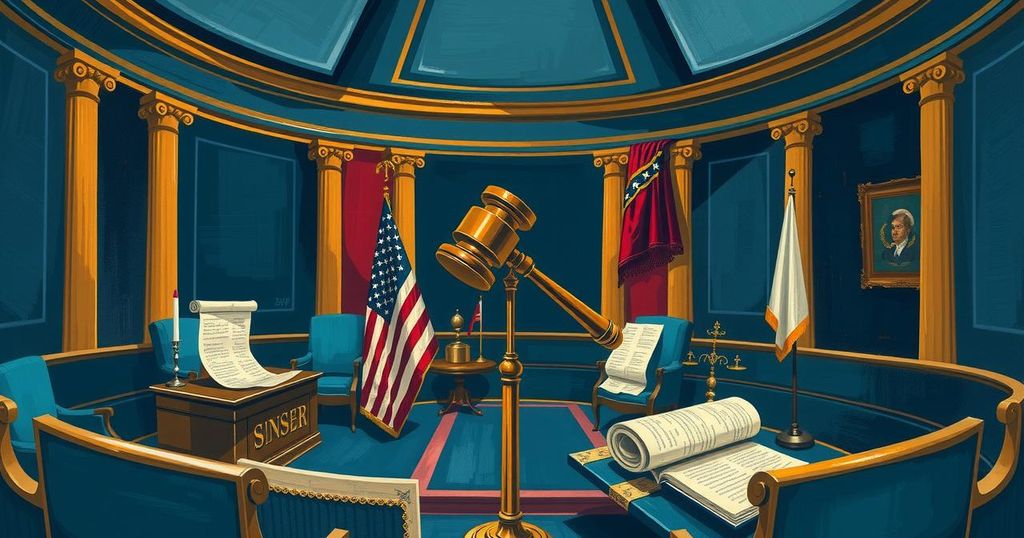Lawmakers Reject Trump’s Strikes on Iran, Cite Constitutional Concerns

Following President Trump’s authorization of airstrikes on Iran’s nuclear sites, Reps. Ro Khanna and Thomas Massie introduced a bipartisan War Powers Resolution. They argue such strikes lack constitutional legitimacy as only Congress can declare war. Lawmakers from both parties have raised concerns about military escalations, emphasizing the need for congressional oversight.
In a recent development, lawmakers are responding to President Donald Trump’s authorization for airstrikes on Iranian nuclear facilities, which has sparked a flurry of constitutional concerns. Bipartisan co-sponsors of the War Powers Resolution, Reps. Ro Khanna, a Democrat from California, and Thomas Massie, a Republican from Kentucky, have swiftly condemned the strikes targeting Fordow, Natanz, and Isfahan. Massie stated, “This is not constitutional,” in light of Trump’s announcement via Truth Social.
The newly introduced War Powers Resolution comes at a time of increasing tensions between the U.S., Israel, and Iran, just as airstrikes have intensified. Reports indicate that both House Speaker Mike Johnson and Senate Majority Leader John Thune were aware of the plans prior to their execution. Critically, Khanna noted that the president acted without congressional approval, asserting the need for a vote on their resolution to prevent further military conflict.
Lawmakers highlighted that Article I of the Constitution grants Congress the exclusive authority to declare war. The purpose of the War Powers Resolution is to remove U.S. armed forces from unauthorized actions involving Iran. Khanna emphasized that representatives must return to Washington, D.C. for a vote to halt any escalatory measures.
In the Senate, Sen. Tim Kaine also introduced a war powers resolution, aiming to gain legislative traction amid these developments. Kaine expressed concern that public sentiment heavily opposes American military action against Iran. He questioned Trump’s decision-making, labeling it as “horrible judgment” and emphasizing the importance of congressional consensus before entering military engagements.
This week, Massie is gathering bipartisan support against U.S. involvement in the ongoing conflict, stating, “This is not our war. But if it were, Congress must decide such matters according to our Constitution.” Notably, the resolution has garnered support from both sides of the aisle, including progressive members of the “Squad” such as Reps. Alexandria Ocasio-Cortez and Ilhan Omar.
Rep. Marjorie Taylor Greene from Georgia echoed similar sentiments on social media, highlighting the necessity for lawmakers to prioritize domestic issues over foreign military engagements. Other original sponsors of the resolution include several progressive Democrats, who criticized Trump’s assertive military action as unconstitutional.
White House Press Secretary Karoline Leavitt mentioned that Trump is expected to make a final decision regarding potential airstrikes within two weeks. As the situation develops, Trump boasted about the successful strikes in his announcement, declaring, “NOW IS THE TIME FOR PEACE!” Even as he spoke, hostilities between Israel and Iran were intensifying, following Israel’s preemptive actions to undermine Iran’s nuclear ambitions.
Iran’s ambassador to Geneva, Ali Bahreini, has firmly stated that Iran will persist in enriching uranium for peaceful purposes, despite the escalating military interventions from both Israel and the U.S. This ongoing conflict underscores the precarious balance of power in the Middle East and raises urgent questions about constitutional governance in matters of war.
The introduction of the War Powers Resolution in the House, along with similar efforts in the Senate, reflects a growing concern over executive military authority and constitutional mandates regarding war declaration. Lawmakers from both political parties are rallying to ensure that Congress plays its mandated role in authorizing military actions, emphasizing a bipartisan call to prevent further escalation in the Middle East.
Original Source: www.foxnews.com






